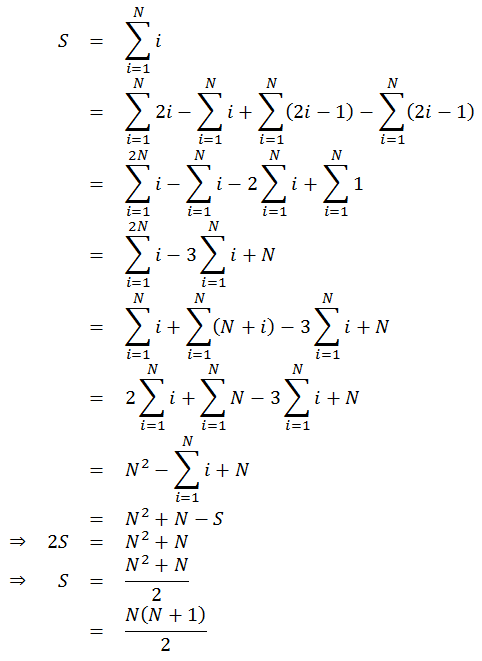Sum of First N Numbers
by Zoran Horvat
Problem Statement
Given a positive number N, write a function which returns sum of numbers 1 + 2 + ... + N.
Example: If N is 5, then return value should be 15 (1 + 2 + 3 + 4 + 5 = 15).
Problem Analysis
This task can be solved quickly by iterating through the sequence:
function Sum(n)
begin
sum = 0
for i = 1 to n
sum = sum + i
return sum
end
This function runs in time O(N) and space O(1). Now we can ask if there is a better solution in terms of running time. In order to make the function run in constant time, we need to entail a definite form of the sum. This is easy to do and here is one possible way:
 The function which calculates the sum of the sequence in O(1) time and O(1) space is then:
The function which calculates the sum of the sequence in O(1) time and O(1) space is then: function Sum(n)
begin
return n * (n + 1) / 2
end
Implementation
Below is the console application in C# which lets the user enter N and then prints the sum of the sequence of N elements.
using System;
namespace SumOfSequence
{
public class Program
{
static int Sum(int n)
{
return n * (n + 1) 2;
}
static void Main(string[] args)
{
while (true)
{
Console.Write("Enter sequence length (zero to exit): ");
int n = int.Parse(Console.ReadLine());
if (n <= 0)
break;
Console.WriteLine("Sum of the sequence is {0}\n", Sum(n));
}
}
}
}
Demonstration
Here is the possible output of the application listed above:
Enter sequence length (zero to exit): 4
Sum of the sequence is 10
Enter sequence length (zero to exit): 5
Sum of the sequence is 15
Enter sequence length (zero to exit): 43127
Sum of the sequence is 929990628
Enter sequence length (zero to exit): 0
If you wish to learn more, please watch my latest video courses

Beginning Object-oriented Programming with C#
In this course, you will learn the basic principles of object-oriented programming, and then learn how to apply those principles to construct an operational and correct code using the C# programming language and .NET.
As the course progresses, you will learn such programming concepts as objects, method resolution, polymorphism, object composition, class inheritance, object substitution, etc., but also the basic principles of object-oriented design and even project management, such as abstraction, dependency injection, open-closed principle, tell don't ask principle, the principles of agile software development and many more.
More...

Design Patterns in C# Made Simple
In this course, you will learn how design patterns can be applied to make code better: flexible, short, readable.
You will learn how to decide when and which pattern to apply by formally analyzing the need to flex around specific axis.
More...

Refactoring to Design Patterns
This course begins with examination of a realistic application, which is poorly factored and doesn't incorporate design patterns. It is nearly impossible to maintain and develop this application further, due to its poor structure and design.
As demonstration after demonstration will unfold, we will refactor this entire application, fitting many design patterns into place almost without effort. By the end of the course, you will know how code refactoring and design patterns can operate together, and help each other create great design.
More...

Mastering Iterative Object-oriented Development in C#
In four and a half hours of this course, you will learn how to control design of classes, design of complex algorithms, and how to recognize and implement data structures.
After completing this course, you will know how to develop a large and complex domain model, which you will be able to maintain and extend further. And, not to forget, the model you develop in this way will be correct and free of bugs.
More...
About

Zoran Horvat is the Principal Consultant at Coding Helmet, speaker and author of 100+ articles, and independent trainer on .NET technology stack. He can often be found speaking at conferences and user groups, promoting object-oriented and functional development style and clean coding practices and techniques that improve longevity of complex business applications.
Elsewhere
Video Courses
- Making Your C# Code More Object-oriented
- Beginning Object-oriented Programming with C#
- Collections and Generics in C#
- Design Patterns in C# Made Simple
- Refactoring to Design Patterns
- Mastering Iterative Object-oriented Programming in C#
- Making Your C# Code More Functional
- Making Your Java Code More Object-oriented
- Writing Purely Functional Code in C#
- Tactical Design Patterns in .NET: Creating Objects
- Tactical Design Patterns in .NET: Control Flow
- Tactical Design Patterns in .NET: Managing Responsibilities
- Advanced Defensive Programming Techniques
- Writing Highly Maintainable Unit Tests
- Improving Testability Through Design
Articles
- Here is Why Calling a Virtual Function from the Constructor is a Bad Idea
- What Makes List<T> So Efficient in .NET?
- Nondestructive Mutation and Records in C#
- Understanding Covariance and Contravariance of Generic Types in C#
- Using Record Types in C#
- Unit Testing Case Study: Calculating Median
- More...